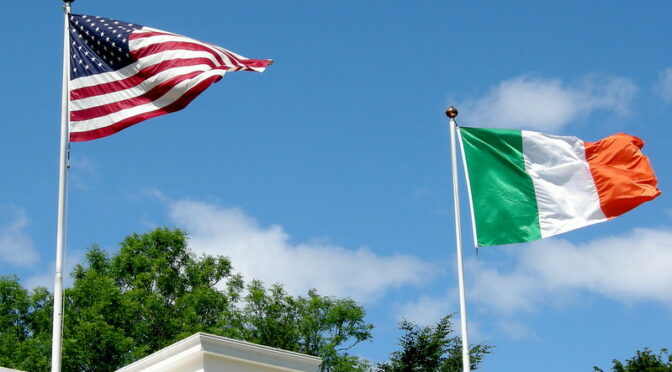Article published in The Daily Telegraph, 13 April 2023. © Richard Kemp
President Biden’s visit to Ireland this week gifts the country an opportunity to sell itself to the world. Pomp, pubs and progressive values are the order of the day; a nation portraying itself as historically oppressed yet forward-thinking and open for business. Through such spin, it is inviting us to just ignore its woeful contributions to Western defence, the elephant in the room given the current war in Europe.
While Biden spoke with Taoiseach Leo Varadkar about the conflict in Ukraine, there is no evidence the President asked for anything tangible to support the Ukrainian war effort. When was the last time an American president included Ireland in their vocal – and justified – criticism of Europe for slacking on its commitments? The fact is, with so many American voters claiming Irish heritage, Ireland gets a free pass, something it shamelessly exploits.
Even if Biden had asked for more military support from Dublin, he’d have been wasting his time. The Irish cupboard is bare. Yes, they have provided some humanitarian aid to Ukraine, including seed potatoes, but their military commitment is limited to an agreement to assign ‘up to 30’ soldiers to help train Ukrainian troops in de-mining. By percentage of GDP, Dublin has the lowest defence spend of all 27 EU members – just 0.3 per cent.Former Foreign Minister Simon Coveney admitted this is ‘roughly a quarter to a half of what other similar-sized countries in Europe spend’.
Ireland’s army is less than 8,000 strong. It has no combat planes and its navy has just mothballed two of six patrol vessels for lack of crew. It is neither capable of monitoring its own air space nor conducting subsurface maritime surveillance. A 2021 Irish government Commission on the Defence Forces damningly concluded that Ireland cannot ‘meaningfully defend’ its own territory.
Most of the country’s military capacity, such as it is, has been used not for self-defence but for international peacekeeping. Whilst valuable, and convenient for virtue-signalling, the dose of reality injected by Putin’s invasion means this should no longer be Ireland’s priority.
While Ireland has adopted a policy of ‘military neutrality’ since the state was founded in 1922, including notoriously in the face of Nazi aggression across Europe, over Ukraine the country has stressed it is not politically neutral, repeatedly condemning Putin’s invasion, joining economic and diplomatic action and making no objection to EU provision of lethal weaponry. Yet its unwillingness to increase defence spending smacks of timorousness akin to the Republic’s approach to Nato. Ireland has never been a member, yet it is happy to in practice shelter behind Nato’s shield, and especially Britain’s.
A once-secret defence pact between the two countries places the burden for defending Irish airspace on the RAF. British jets have reportedly scrambled on numerous occasions to intercept Russian planes entering Irish airspace. Ireland’s vulnerability to pretty much all forms of attack has to be covered by British and other Nato forces. Three quarters of transatlantic telecommunications cables pass through the Republic’s maritime Exclusive Economic Zone and the risk of major disruption by cyberattacks against national infrastructure and international corporations was highlighted in 2021 by a major Russian cyberattack on the health system.
The right thing to do would be to properly recompense Britain for its protection. But there is little chance of that – countries that define themselves as ‘anti-colonial’ never want to lower themselves by appearing dependent on their former imperial masters.
Noting Finland’s accession to Nato and Sweden’s hopes to do so, Dublin seems finally to be waking up to just how unsustainable its position now is. It has just announced a consultative forum to seek public opinions on the current policy of military neutrality. Any significant change will be challenging, involving radical adjustment of defence priorities as well as very substantial spending commitments – the Commission on the Defence Forces recommended a significant rise in the defence budget.
A greater obstacle is Sinn Fein. An opinion poll published at the weekend shows it continues to be Ireland’s most popular party by a significant margin. If it maintains its poll lead, Sinn Fein could be the largest party in the Dail at the next election, sometime before April 2025. The party has a worrying track record of Putin apologism and strong animosity to Nato. Its TDs refused to vote against a recent amendment in the Dail seeking to blame Nato for the war in Ukraine. If the party is in a position to do so, we can be sure it will obstruct any attempt to join the alliance.
Every Western country without exception must step up to the plate in the face of the challenges we now face from Russia and China. Direct pressure from a US president has a greater effect in Ireland than most other countries. Even Sinn Fein leader Mary Lou McDonald was making the right noises on Ukraine in advance of Biden’s visit, whatever the true feelings of her party. So it is time for him to set aside his Irish sentimentality and take away Dublin’s brazen free pass on defence spending.
Image: Flickr

